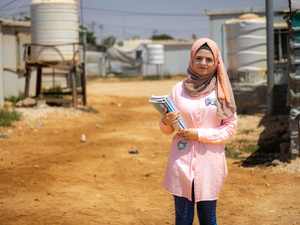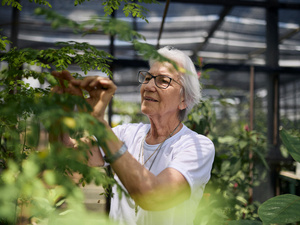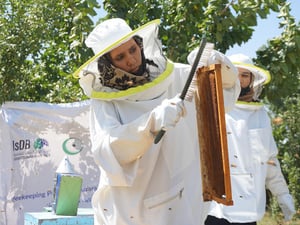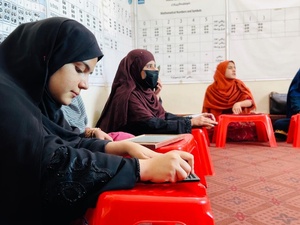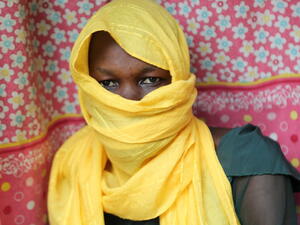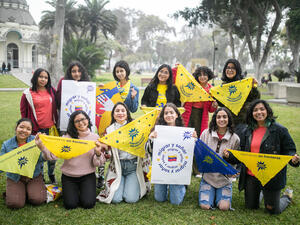Chin women from Myanmar find help down a winding lane in Delhi
Chin women from Myanmar find help down a winding lane in Delhi

Australian Minister of Immigration and Citizenship Chris Evans talks with refugee women at the Women's Protection Clinic in New Delhi.
NEW DELHI, India, August 3 (UNHCR) - Life as a refugee is often traumatic, but it sometimes helps if you can talk to someone sympathetic outside the family about your problems, challenges and hopes. In a nondescript house down a winding lane in western New Delhi, the UNHCR-run Women's Protection Clinic (WPC) provides that friendly shoulder for women refugees from Myanmar.
The WPC opened its doors in 2005 and has been funded for most of that time by the government of Australia. Senator Chris Evans, Australia's Minister for Immigration and Citizenship, pledged continued financial support for the clinic during a tour of the facility in late July.
More than 1,250 refugee women and girls from Myanmar's ethnic Chin community have received counselling in the clinic, which maintains a policy of strict confidentiality. Earlier this year, the WPC also opened its doors to female asylum seekers from Myanmar.
But the most vital function of the clinic is to highlight protection gaps and find solutions to immediate needs. The clinic helps UNHCR identify those women who are most vulnerable and in need of resettlement to a third country.
Joyce, a 56-year-old who fled to India three years ago with her husband and four children, is typical of those who come to see the counsellors and other experts at the centre. "I had financial problems that led to mental problems," Joyce recalled. "When I shared my problems and difficulties with people at the clinic, my load became physically and mentally lighter. They gave good advice and counselling."
The WPC counsellors steered her towards the UNHCR partner, Don Bosco Ashayalam, which runs an income-generation project for refugee women. Joyce and her elder daughter now help produce a line of clothing under the Koshish label, which brings them valuable income and self-esteem. Under Indian law, refugees can only work in the informal, unregulated labour sector.
The centre has directed several women towards other non-governmental organizations that have expertise or programmes that can help them.
Theresa is a single mother with a three-year-old son. She fled from Myanmar not long after her first husband died three years ago. She remarried in New Delhi, but soon had marital problems. "My husband did not accept my child. I had no one to share this with in my community. It was all so personal," she told UNHCR.
The Chin woman and her husband divorced by mutual consent, but this was frowned on by some in her conservative community. Theresa decided to visit the centre for counselling. "I got a lot of support. I felt as if I was sharing my life with my mother," she said, adding: "When I was counselled, I felt strong - as if I could bear all the pain."
For women like Theresa, the clinic has provided a refuge where they can discuss their worries and concerns without fear of being judged. It has enabled many women to cope with their lives, to pick up the threads, learn skills. "We find our way again," Joyce reflected.
Aside from meeting UNHCR staff, women of the Myanmar refugee community in the Indian capital also use the WPC as a forum to discuss issues of general importance to them, such as health and education.
"When we meet with UNHCR officers here, they give us information that we can share with our communities," said Elisabeth, a representative of various women's groups. "They explain what to do when we need assistance with health and education. They also explain why sometimes it takes so long to get a refugee status interview." For UNHCR this is also a good platform to share policy changes and to take stock of how well existing programmes are working.
One of the unexpected benefits of the WPC has been that it has empowered refugee women in the Myanmar community. "Some men don't understand why it's only for women. Now most have understood that it's also for the whole family," said Elisabeth. "We get more respect from our community now. The men tell us to take their problems to the WPC."
UNHCR provides protection and assistance to some 11,850 refugees in India, mostly from Afghanistan (8,500), Myanmar (2,500) and Somalia (600).
By Nayana Bose in New Delhi, India

